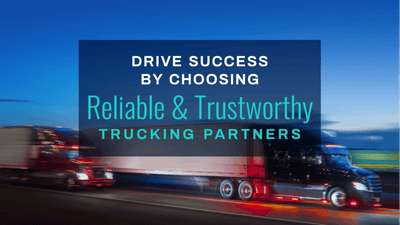November 28, 2017 | Cargo Insurance, Industry Insights
Preparing for the Road Ahead: Autonomous Vehicles & Vessels

The race to get autonomous vehicles and vessels on the road and on our waterways is set to impact the way the logistics industry operates. While the reality of self-driving vehicles and vessels in still in the distant future, those throughout the logistics supply chain should be taking a close look at what is taking place and preparing for that day.
Test runs have already been conducted or are being planned in the autonomous space. For example, Anheuser-Bush conducted a 120-mile driverless “beer run” last year between Fort Collins and Colorado Springs. Otto, the company behind the self-driving truck, expects to see the type of artificial intelligence (AI) used in the test run as the co-pilot for a truck driver – at least initially. DHL is planning to test self-driving delivery trucks in the second half of 2018. To get a fleet up and running, DHL said it plans to equip some of its existing electric delivery trucks with new self-driving equipment from tech company NVIDIA and the automotive supplier ZF. The experiment, according to an article in CNN, will feature self-driving delivery trucks that follow a delivery person en-route to deliver packages. The person wouldn’t need to get back into the truck between dropping off packages; they’d need to remove packages from the rear of the truck. DHL will also test whether autonomous vehicles can be used to exchange containers in parcel centers.
The benefit of autonomous trucks for companies includes greater energy efficiency, which will result in eventual cost savings and an improved corporate carbon footprint. Another benefit of self-driving vehicles is the ability to address the labor shortage in the U.S. In 2016 there was a shortage of about 50,000 drivers in our country, with projections showing the need for an additional 100,000 drivers for 2017, as the workforce is aging. According to information from truckinginfo.com, the average truck driver is 49 years old, with many drivers looking to retire, particularly those in the long-haul trucking sector where individuals are away from home for long stretches of time and are able to find more attractive jobs within the industry locally.
Autonomous trucks also benefit the drivers themselves. Technology advances will result in better safety. While drivers will have to continue to remain alert, there are areas such as speed, acceleration and breaking that will be controlled by automation, ultimately improving road safety.
On the High Seas
With regard to autonomous vessels, a Norwegian agricultural fertilizer company has commissioned the world’s first fully autonomous cargo ship, the Yara Birkeland, to be launched in 2020. The Yara Birkeland will operate close to the Norwegian coast at all times, as current international shipping law states that ocean-going vessels must be properly crewed, so fully autonomous, unmanned ships are not permitted in international waters. The cargo ship when launched will carry out regular short journeys between three ports in the south of Norway.
Several Japanese shipping firms are also investing hundreds of millions of dollars in autonomous technology. And British firm Rolls Royce demonstrated the world’s first remote-controlled unmanned commercial ship earlier this year. This is all in anticipation that changes in current shipping laws will eventually take place: Earlier this year, the United Nation’s International Maritime Organization (IMO) began discussions that could allow unmanned ships to operate across oceans one day.
It’s important to note that in both the trucking and shipping industries, many practical, complex regulatory and technological barriers remain before we have true autonomous fleets. Equally important, however, is for the logistics and transportation industries to begin considering a future that includes autonomous vehicles and ships.
Roanoke Insurance Group specializes in insuring logistics providers and, as such, we continue to keep our pulse on technology trends and how they will impact the industry. For information about our insurance products and services, surety bonds and ATA Carnets, please contact one of our Roanoke Insurance Group professionals at 1-800-ROANOKE (800-762-6653).
Sources: Industry Week, CNN












